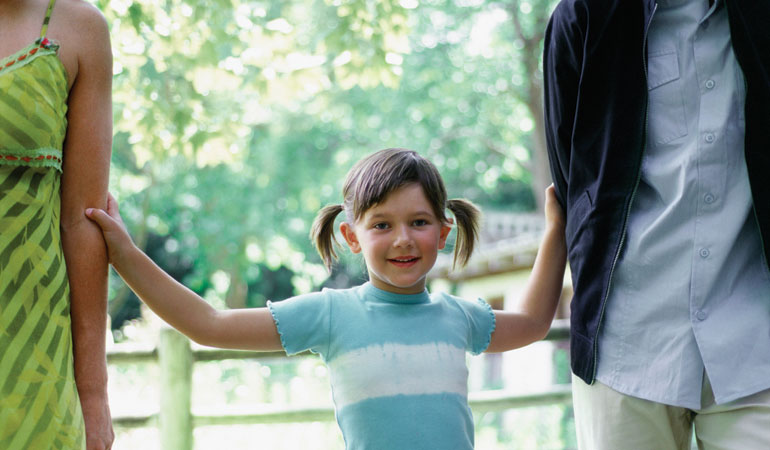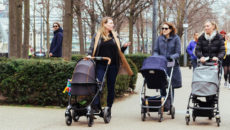My daughter, Gracie, and her playmate laugh together as they run toward her stash of toys. Seconds later, each has a death-grip on the same doll stroller and they’re both sobbing.”Mine, mine!” Gracie screams.
Is her possessive behavior a normal, 3-year-old thing, or could it be due to the fact that she’s an only child who never has to share? I’m far from alone in wondering about this.
Only-child households are the fastest-growing family unit in the United States. It’s especially popular with adoptive families, who may have waited longer and encountered more challenges before becoming parents. In fact, nearly 50 percent of our families adopt only one child.
Nevertheless, myths about dysfunctional, spoiled only children continue to haunt many parents. Here, we take a look at the benefits and drawbacks of choosing an only-child household, drawing on experiences and advice from families and experts, to help you answer the question: Is raising your child as an “only” the right choice — for you, and for your child?
A bigger piece of the pie
Yes, says Karen Moline, mother of Vietnamese-born Emmanuel Thanh Sang. “My son gets my undivided attention when I’m done working for the day.”
As a single mother, Moline considers one child manageable. She travels for her work as a journalist and is able to bring her son along on assignments. With two children, this wouldn’t be possible.
“I’ve seen a huge increase in single-parent adoptions, and many singles prefer to have only one child,” says Brenda McCreight, Ph.D., a family and child therapist who specializes in adoption issues. “They don’t want to spread either their sole income or their energy too thin.”
Money is also a consideration in two-parent homes, and finances can be especially tight for adoptive families. “We weigh spending our money to adopt a sibling versus adding to the college fund,” says Elaine Lane, currently raising an only child and struggling with the decision of whether or not to adopt again.
A second child means less time for you — for your personal interests, your career, and social commitments. A friend of mine quips, “Raising one child is like a hobby; raising two is a job.” While I don’t quite agree with the hobby part of the equation, I do like the balance in my life that one child allows: time for working, exercising, and seeing friends, as well as time for being active in adoption organizations and playing with my daughter.
“The only child has the supreme advantage of having his parents’ full resources, and that doesn’t just mean money, that means time and intellectual input,” says Susan Newman, Ph.D., author of Parenting an Only Child. “You can read twice as many books at night, and you can go to museums and take trips more easily.”
How much is too much?
At some point, though, you have to learn to draw the line. A friend of mine, who’s raising six of her grandchildren, looks at my daughter and shakes her head. “Mmm, mmm, mmm,” she clucks. “Bet she’s spoiled.”
Well, maybe. My daughter, like most onlies, has her own room and a decent stock of toys. And when she wants my attention, she can usually get it.
But, partly because of the common belief that only children are overindulged, my husband and I are careful to lay down the law. And we’re not alone. “I’m of the tough-love school about allowances and so on,” says Moline.
Parents of onlies also worry about giving their children too much of themselves. “She now commands all the attention that we would have been giving to two children,” says Cindy Hodgeman, who is raising her daughter, Kiah, as an only since her older child died. “I think an only child can get too much attention, even if it is good, loving attention.”
Carolyn White, editor of Only Child magazine and author of The Seven Common Sins of Parenting an Only Child, agrees. “Only children are like kids on stage,” she writes. “When they are in the spotlight, magical things can happen, but if they make mistakes, each one stands out.”
It’s a good idea to ignore some of the mistakes your child makes, as well as some of the adorable things he does. Shine the spotlight on your own adult interests at times, leaving your child space to experiment, play, and learn without close observation.
Of course, lots of focus from mom and dad can have wonderful benefits, especially to children with special needs. “Parental attention is very important for a child who spent her early days in an orphanage, since she probably lacked much individual care,” says McCreight. And, if an only child has learning needs, “the parents will be able to do extra work with her in the evenings without depriving a second child.”
The loneliest number
“I don’t want to be all alone,” my extremely social daughter complains. As I pick up the phone to set up another play date, I wonder: Would she be better off with a couple of siblings to keep her company now — and when she’s an adult?
Violet Kurylak, proud mother of Elena, cites providing playmates as the most significant challenge of raising an only child. “She often insists that Mama play,” she says, “even if I would prefer to be doing almost anything else.” At times like this, she wishes Elena had a brother or sister. “Then I could tell them both to run along and play together.”
But parents find ways to handle the companionship conundrum, whether by scheduling regular play dates with friends who can become surrogate siblings or building close connections with cousins. “I signed us up for mother-daughter play groups when Ariel was 2 months old, so that she could interact with other babies from the start,” says Kelli Suchy, a stay-at-home mother.
In some families, the loneliness factor drives the decision to provide a sibling. “My son lived in an orphanage until he was nearly 5. From the beginning, he missed having lots of other people around,” says single mother Marcia Day, who has decided to adopt a second child. She adds, “I know from my own experience that the sibling connection is also important in adulthood, not just during the growing-up years.”
But what do the experts say? Newman’s research suggests that only children are no more lonely and antisocial than children with siblings. Such myths arose when families with only children were anomalies. But, now that only-child families have gained numbers, it’s clear that most onlies have networks of friends through school, day care, sports, and play groups.
A second child?
For families deciding whether to adopt again, any number of reasons figure in the calculation. In transracial adoptions, some parents consider a second adoption so their first child won’t be the only person of color in the family. “I’d say I think about this on a daily basis,” says Moline.
Among older parents, age raises some obvious questions. “We wonder if we’d have the energy for a second child,” says one mom. “But, since we’re older parents, we would like her to have a sibling to turn to when she is older. So we go back and forth between what we would like for her, and what we feel we can handle.”
A common complaint from parents of onlies is that they’re pressured to provide a sibling for their child. For most single-child adoptive families, however, the pressure comes mostly from within.
“Everyone knows how hard and how long we worked to have a baby,” says Suchy. “So we are supported in our decision to have only Ariel.”
Some adoptive families feel empowered by their route to parenthood, and so know better than to give in to pressure. “I’ve learned to tune out much of what others say about my family,” says Moline.
Even if you decide to remain a single-child family, you may have to deal with the fact that your child is not a true only. He may have birth siblings — known or unknown.
“For us, the saddest part is that we know he has two biological brothers, who live with their birth mother,” says Susan Penn of her decision to raise her son as an only. “When he’s old enough to understand that information, I imagine it will be very painful.” In families that have an open relationship with their child’s birth family, however, the birth siblings may provide welcome sources of friendship and support.
The right balance
Despite my adoration, I sometimes see my daughter’s whiny, dependent, and bossy sides, and fear that she’s fulfilling all the only-child stereotypes. But, as Newman points out, even in large families, there’s often a child who’s clingy or overindulged.
I sometimes think about adding to our family. But for now, we’ve found the right balance. When I look at my Gracie, I see how she’s thriving as an only child. Her life isn’t perfect, but there are plenty of kids who like to come over for a visit when she’s lonely, and, as the parent of an only, I have the time, space, and energy to enjoy having them.



